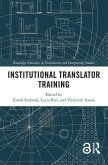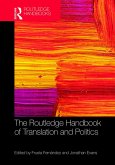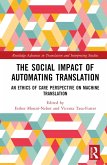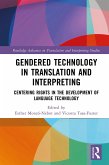Toward Inclusion and Social Justice in Institutional Translation and Interpreting (eBook, ePUB)
Revealing Hidden Practices of Exclusion
Redaktion: Monzó-Nebot, Esther; Lomeña-Galiano, María
42,95 €
42,95 €
inkl. MwSt.
Sofort per Download lieferbar

21 °P sammeln
42,95 €
Als Download kaufen

42,95 €
inkl. MwSt.
Sofort per Download lieferbar

21 °P sammeln
Jetzt verschenken
Alle Infos zum eBook verschenken
42,95 €
inkl. MwSt.
Sofort per Download lieferbar
Alle Infos zum eBook verschenken

21 °P sammeln
Toward Inclusion and Social Justice in Institutional Translation and Interpreting (eBook, ePUB)
Revealing Hidden Practices of Exclusion
Redaktion: Monzó-Nebot, Esther; Lomeña-Galiano, María
- Format: ePub
- Merkliste
- Auf die Merkliste
- Bewerten Bewerten
- Teilen
- Produkt teilen
- Produkterinnerung
- Produkterinnerung

Bitte loggen Sie sich zunächst in Ihr Kundenkonto ein oder registrieren Sie sich bei
bücher.de, um das eBook-Abo tolino select nutzen zu können.
Hier können Sie sich einloggen
Hier können Sie sich einloggen
Sie sind bereits eingeloggt. Klicken Sie auf 2. tolino select Abo, um fortzufahren.

Bitte loggen Sie sich zunächst in Ihr Kundenkonto ein oder registrieren Sie sich bei bücher.de, um das eBook-Abo tolino select nutzen zu können.
This collection re-envisions the academic study of institutional translation and interpreting (ITI), revealing oppression in established institutional spaces toward challenging existing policies within the field.
- Geräte: eReader
- mit Kopierschutz
- eBook Hilfe
Andere Kunden interessierten sich auch für
![Toward Inclusion and Social Justice in Institutional Translation and Interpreting (eBook, PDF) Toward Inclusion and Social Justice in Institutional Translation and Interpreting (eBook, PDF)]() Toward Inclusion and Social Justice in Institutional Translation and Interpreting (eBook, PDF)42,95 €
Toward Inclusion and Social Justice in Institutional Translation and Interpreting (eBook, PDF)42,95 €![Critical Approaches to Institutional Translation and Interpreting (eBook, ePUB) Critical Approaches to Institutional Translation and Interpreting (eBook, ePUB)]() Critical Approaches to Institutional Translation and Interpreting (eBook, ePUB)42,95 €
Critical Approaches to Institutional Translation and Interpreting (eBook, ePUB)42,95 €![Critical Approaches to Institutional Translation and Interpreting (eBook, PDF) Critical Approaches to Institutional Translation and Interpreting (eBook, PDF)]() Critical Approaches to Institutional Translation and Interpreting (eBook, PDF)42,95 €
Critical Approaches to Institutional Translation and Interpreting (eBook, PDF)42,95 €![Institutional Translator Training (eBook, ePUB) Institutional Translator Training (eBook, ePUB)]() Institutional Translator Training (eBook, ePUB)0,00 €
Institutional Translator Training (eBook, ePUB)0,00 €![The Routledge Handbook of Translation and Politics (eBook, ePUB) The Routledge Handbook of Translation and Politics (eBook, ePUB)]() The Routledge Handbook of Translation and Politics (eBook, ePUB)46,95 €
The Routledge Handbook of Translation and Politics (eBook, ePUB)46,95 €![The Social Impact of Automating Translation (eBook, ePUB) The Social Impact of Automating Translation (eBook, ePUB)]() The Social Impact of Automating Translation (eBook, ePUB)42,95 €
The Social Impact of Automating Translation (eBook, ePUB)42,95 €![Gendered Technology in Translation and Interpreting (eBook, ePUB) Gendered Technology in Translation and Interpreting (eBook, ePUB)]() Gendered Technology in Translation and Interpreting (eBook, ePUB)42,95 €
Gendered Technology in Translation and Interpreting (eBook, ePUB)42,95 €-
-
-
This collection re-envisions the academic study of institutional translation and interpreting (ITI), revealing oppression in established institutional spaces toward challenging existing policies within the field.
Dieser Download kann aus rechtlichen Gründen nur mit Rechnungsadresse in A, B, BG, CY, CZ, D, DK, EW, E, FIN, F, GR, HR, H, IRL, I, LT, L, LR, M, NL, PL, P, R, S, SLO, SK ausgeliefert werden.
Produktdetails
- Produktdetails
- Verlag: Taylor & Francis eBooks
- Seitenzahl: 248
- Erscheinungstermin: 29. März 2024
- Englisch
- ISBN-13: 9781003862918
- Artikelnr.: 70047944
- Verlag: Taylor & Francis eBooks
- Seitenzahl: 248
- Erscheinungstermin: 29. März 2024
- Englisch
- ISBN-13: 9781003862918
- Artikelnr.: 70047944
- Herstellerkennzeichnung Die Herstellerinformationen sind derzeit nicht verfügbar.
Esther Monzó-Nebot is an associate professor in translation and interpreting in the Department of Translation and Communication at Universitat Jaume I, Spain. María Lomeña-Galiano is an associate professor in translation studies in the Department of Foreign Languages and Translation at Université Rennes 2, France.
List of Contributors
Introduction
1. Inroads into unchartered spaces in institutional translation and interpreting studies
Esther Monzó-Nebot
Section I: Revealing oppression in and through translation and interpreting
2. Deterrence through lack of linguistic access within the US immigration deportation system
Laura Belous & Jaime Fatás-Cabeza
3. Linguistic and epistemic discrimination against migrants in Italian asylum procedures
Maurizio Veglio
4. Hidden patterns in interpreting xenophobic discourse in the European Parliament
Barbara Hinterplattner
Section II: Revealing and debunking myths
5. Implementing gender-fair language in international organizations: Collective illusions and gender bias in translation sections
Esther Monzó-Nebot & Helen Debussy
6. A project for making interpreters' silent knowledge heard
Kristina Gustafsson, Eva Norström & Linnéa Åberg
7. "We sold we were perfect." Revealing health risks for translators and interpreters at international organizations
Esther Monzó-Nebot
Section III: Revealing translation and interpreting in institutional spaces
8. Conference signed language interpreting services ati international organizations: Breaking the barriers.
Maya de Wit
9. Overcoming language barriers in Belgium: Enhancing communication in prisons to facilitate successful reintegration?
Heidi Salaets, Jonathan Bernaerts and Shanti Heijkants
10. Being protected, feeling autonomous. Workplace values in the translation culture of the Language Interpreting Office(Spanish Ministry of Foreign Affairs)
Nuria Brufau-Alvira
Conclusions
11. Taking stock and chartering the territories of institutional translation and interpreting
Esther Monzó-Nebot & María Lomeña-Galiano
Index
Introduction
1. Inroads into unchartered spaces in institutional translation and interpreting studies
Esther Monzó-Nebot
Section I: Revealing oppression in and through translation and interpreting
2. Deterrence through lack of linguistic access within the US immigration deportation system
Laura Belous & Jaime Fatás-Cabeza
3. Linguistic and epistemic discrimination against migrants in Italian asylum procedures
Maurizio Veglio
4. Hidden patterns in interpreting xenophobic discourse in the European Parliament
Barbara Hinterplattner
Section II: Revealing and debunking myths
5. Implementing gender-fair language in international organizations: Collective illusions and gender bias in translation sections
Esther Monzó-Nebot & Helen Debussy
6. A project for making interpreters' silent knowledge heard
Kristina Gustafsson, Eva Norström & Linnéa Åberg
7. "We sold we were perfect." Revealing health risks for translators and interpreters at international organizations
Esther Monzó-Nebot
Section III: Revealing translation and interpreting in institutional spaces
8. Conference signed language interpreting services ati international organizations: Breaking the barriers.
Maya de Wit
9. Overcoming language barriers in Belgium: Enhancing communication in prisons to facilitate successful reintegration?
Heidi Salaets, Jonathan Bernaerts and Shanti Heijkants
10. Being protected, feeling autonomous. Workplace values in the translation culture of the Language Interpreting Office(Spanish Ministry of Foreign Affairs)
Nuria Brufau-Alvira
Conclusions
11. Taking stock and chartering the territories of institutional translation and interpreting
Esther Monzó-Nebot & María Lomeña-Galiano
Index
List of Contributors
Introduction
1. Inroads into unchartered spaces in institutional translation and interpreting studies
Esther Monzó-Nebot
Section I: Revealing oppression in and through translation and interpreting
2. Deterrence through lack of linguistic access within the US immigration deportation system
Laura Belous & Jaime Fatás-Cabeza
3. Linguistic and epistemic discrimination against migrants in Italian asylum procedures
Maurizio Veglio
4. Hidden patterns in interpreting xenophobic discourse in the European Parliament
Barbara Hinterplattner
Section II: Revealing and debunking myths
5. Implementing gender-fair language in international organizations: Collective illusions and gender bias in translation sections
Esther Monzó-Nebot & Helen Debussy
6. A project for making interpreters' silent knowledge heard
Kristina Gustafsson, Eva Norström & Linnéa Åberg
7. "We sold we were perfect." Revealing health risks for translators and interpreters at international organizations
Esther Monzó-Nebot
Section III: Revealing translation and interpreting in institutional spaces
8. Conference signed language interpreting services ati international organizations: Breaking the barriers.
Maya de Wit
9. Overcoming language barriers in Belgium: Enhancing communication in prisons to facilitate successful reintegration?
Heidi Salaets, Jonathan Bernaerts and Shanti Heijkants
10. Being protected, feeling autonomous. Workplace values in the translation culture of the Language Interpreting Office(Spanish Ministry of Foreign Affairs)
Nuria Brufau-Alvira
Conclusions
11. Taking stock and chartering the territories of institutional translation and interpreting
Esther Monzó-Nebot & María Lomeña-Galiano
Index
Introduction
1. Inroads into unchartered spaces in institutional translation and interpreting studies
Esther Monzó-Nebot
Section I: Revealing oppression in and through translation and interpreting
2. Deterrence through lack of linguistic access within the US immigration deportation system
Laura Belous & Jaime Fatás-Cabeza
3. Linguistic and epistemic discrimination against migrants in Italian asylum procedures
Maurizio Veglio
4. Hidden patterns in interpreting xenophobic discourse in the European Parliament
Barbara Hinterplattner
Section II: Revealing and debunking myths
5. Implementing gender-fair language in international organizations: Collective illusions and gender bias in translation sections
Esther Monzó-Nebot & Helen Debussy
6. A project for making interpreters' silent knowledge heard
Kristina Gustafsson, Eva Norström & Linnéa Åberg
7. "We sold we were perfect." Revealing health risks for translators and interpreters at international organizations
Esther Monzó-Nebot
Section III: Revealing translation and interpreting in institutional spaces
8. Conference signed language interpreting services ati international organizations: Breaking the barriers.
Maya de Wit
9. Overcoming language barriers in Belgium: Enhancing communication in prisons to facilitate successful reintegration?
Heidi Salaets, Jonathan Bernaerts and Shanti Heijkants
10. Being protected, feeling autonomous. Workplace values in the translation culture of the Language Interpreting Office(Spanish Ministry of Foreign Affairs)
Nuria Brufau-Alvira
Conclusions
11. Taking stock and chartering the territories of institutional translation and interpreting
Esther Monzó-Nebot & María Lomeña-Galiano
Index







